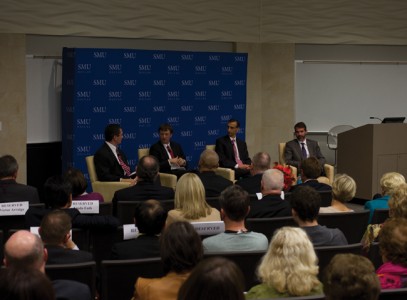
SMU’s Tower Center took its turn facilitating the conversation around intelligence and privacy Tuesday. The Center welcomed the National Security Agency’s Director of Compliance John DeLong to join SMU professors Jeffrey Kahn and Joshua Rovner for a diverse panel on issues of oversight, legal interpretation and the essentiality of thorough intelligence gathering.
While this past summer’s NSA leaks were clearly the igniting force for such a panel to take place, the discussion began far past defensiveness or blame on the incidents and aftermath that unraveled over the past months. Rather, moderator Jeffrey Engel, director of Center for Presidential History at SMU, opened by turning focus to the status of modern-day war — one defined within cyberspace, not within lines of geographical territory.
The technology that creates the cyberspace battle is precisely what dictates the need for the new generation of NSA surveillance gathering — intelligence observation that DeLong said is a decision that starts with “law and policy,” driven by “foreign intelligence needs,” not ones of purely domestic origin.
With concerns over citizens’ privacy and lack in Congressional oversight, DeLong emphasized the foreign focus of intelligence. If surveillance does move to a U.S. citizen, it is only after the gap has been closed “between foreign objectors…connecting the dots” back to the U.S.
“There’s not an analyst at the NSA that wants to come across a U.S. persons [when investigating terrorism],” DeLong said.
In his opening comments, Rovner outlined possible motivations behind the “strategic value in performing intelligence on one’s own citizens.” Counterintelligence can be a power’s greatest asset — terrorists and rival states alike perform intelligence against the U.S. As for the value of spying on one’s allies, Rovner cited one instance of seeing “just how vulnerable they are to espionage,” as well as identifying “what their bargaining positions are.”
The costs are also great, including loss of prestige and breaks in alliances when trust is broken.
But Kahn made it clear that the NSA question was not one of liberty versus security because intelligence is not malice-driven.
“[However,] to say there’s no malice is not to say there’s no bias,” Kahn said, speaking to institutional bias.
He posed the question, “Do you want to be the analyst who makes the critical mistake?” The mistake in reference is not one of identifying a U.S. citizen as a surveillance suspect, but one of not identifying a possible terrorist because he or she is a U.S. citizen.
The dissent surrounding congressional oversight was also a key point of contention throughout the panel. In Kahn’s words, “what’s oversight and what’s sufficient oversight is contested.”
DeLong spoke to Congressional oversight coming from a multitude of government facets, pertaining to legal aspects, funding, et cetera.
But Kahn begged the meaning of oversight when sectors of Congress see different aspects of intelligence materials, without unified clearance or level of input.
“You have a small number of representatives…who have access [to classified material] but who can’t do anything about it,” Rovner said. “They leave the room.”
Is complete oversight then legitimate if not everyone has “teeth” in the ultimate outcome? DeLong insisted that the NSA is completely rooted in oversight and that system of checks and balances — to have “that constant compliance and that constant oversight.”
DeLong’s resonating point throughout the night, however, was one on the fundamental difference between ability and follow through, in what surveillance collects and what is actually utilized.
“There is a big difference between the capability to do something, and the use of that capability,” DeLong said.









